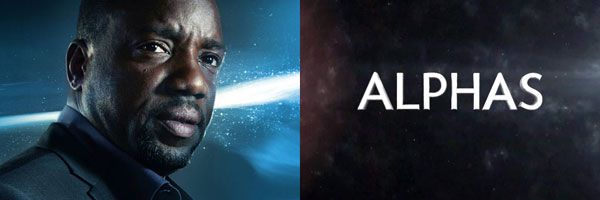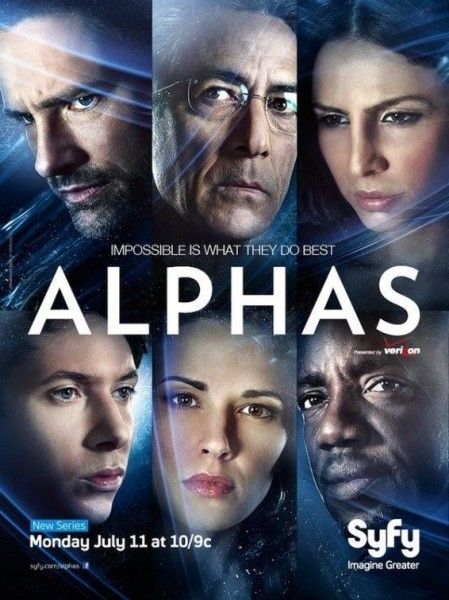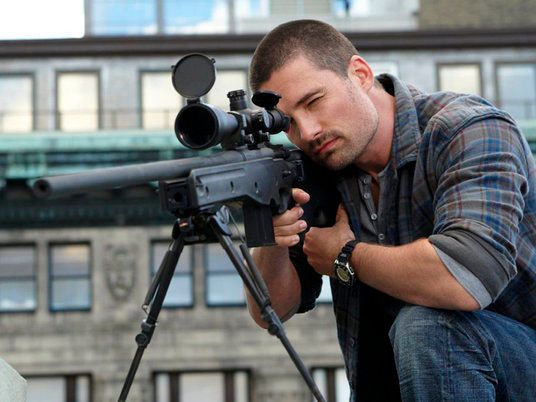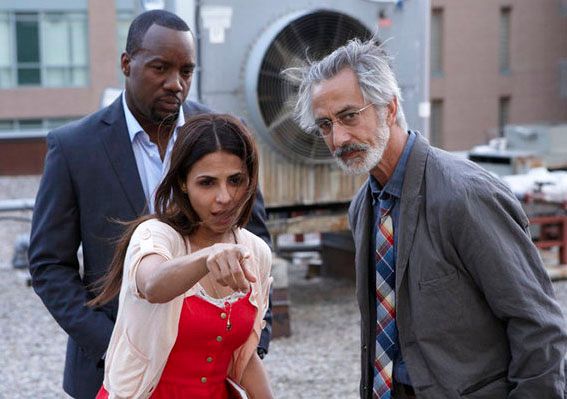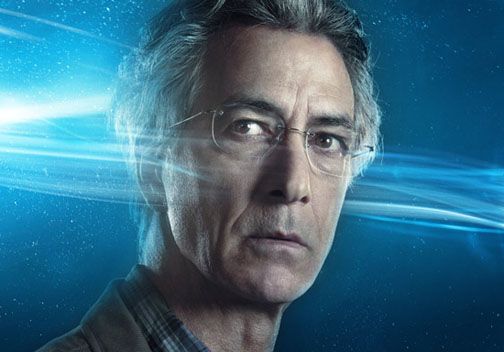On the new SyFy series Alphas, actor Malik Yoba plays Bill Harken, a former FBI agent who strictly adheres to procedure and protocol, and who has to always be aware of the amazing strength that comes from his special ability to activate his fight-or-flight response at will. His super-human strength and a resistance to harm that borders on invulnerability is what brings him to the attention of Dr. Lee Rosen (David Strathairn), who makes him part of a clandestine group of individuals that investigate cases that point to others with Alpha abilities.
During this exclusive interview with Collider, Malik Yoba talked about what attracted him to Alphas, after having done 10 other TV series in the past, how he loves his character’s flaws, the collaboration between the writers and actors, and how they’re encouraged to do improv and bring humor to the show. He also talked about the desire to want to write and direct his own projects, and his hope to do more comedy. Check out what he had to say after the jump:
Question: How did you get involved with Alphas?
MALIK YOBA: I got involved in a traditional way. The script was sent out to agent, my agent reached out to me and sent it to me, but I wasn’t really interested in doing another series, quite frankly, having done so many of them. You leave your family and your loved ones longer than you want to, and television is a hard nut to crack. This is my 11th series and they aren’t all successful. It’s been over 10 years since the last show I did that made it past one season. I’ve done almost one a year since then, and in some cases two a year, so I wasn’t really interested in repeating that. The world is changing and how we reach people has changed. It’s no longer throwing ads on your network and putting up billboards. It’s now social media and things move virally, and the networks haven’t always caught up to that, so that was part of my frustration as well. I just wanted to be involved with something where people were forward-thinking.
What was it about this character that finally caught your interest and made you decide to take it on?
YOBA: My character’s Alpha ability is his fight-or-flight mechanism that he can activate at will, but it doesn’t always work out for him. He’s still trying to figure out how to make it work for him. That’s where the flaws come in, and that’s the fun part.
Did you like the fact that these characters have consequences with using their abilities?
YOBA: Yeah, absolutely. Batman can’t fly, so he jumps on a building and the danger is right there waiting for him. We’re not superheroes. I love the fact that there are consequences because that gives us more to play with. I’m really looking forward to really getting into the world of these people.
SyFy has had tremendous success with this type of original programming. Do you think those viewers will be able to connect with this show?
YOBA: It’s a crapshoot, really. Who knows why people like what they like. I think that we produce a good show, there’s a great team involved with all the creative folks, and SyFy is very forward-thinking in how they want to get the word out, but it remains to be seen. At this juncture, I never like to be the person trying to hard sell, saying, “This is why you should watch it.” I know that my fans, who have followed me for years, want to know what I’m doing. As long as we get the word out to all fan bases, people will come and give it a shot and decide for themselves whether or not they should watch it, and I hope they do. I think we have something. I really do. When you do a pilot, you can’t always tell what you have. If you go back and look at the pilot of Seinfeld, no one would have thought that show would be what it became, and television isn’t given that kind of chance anymore. If you’re not hitting it quickly and having success, they’re trying to move onto the next thing. So, using some of these other ways of getting the word out and engaging audiences in a different way can help a show succeed, in a way that it couldn’t have in the past.
What can you say about who your character is and how he comes to team up with these Alphas?
YOBA: Bill Harken was an FBI agent that had an incident within the bureau and someone ended up with a broken arm. That’s an example of Harken’s Alpha ability going awry. I don’t think he even understood how that happens. He thinks, “I shook his hand. I don’t know how his arm broke in three places. It wasn’t a fight. It wasn’t an argument.” We haven’t fully defined exactly what happened, but it was something like that and, the next thing he knows, he’s being reassigned under the care of this doctor. He’s not crazy, but he discovers that he’s a part of a group of people who have these abilities and he’s calling them Alphas. On top of that, now they’re being pulled into these crimes and investigations, and he’s working with people who aren’t trained to do this. In that inherent conflict is the space for a lot of comedy and drama. So, my character is still trying to figure it out. He’s reassigned, but he still thinks very much like a law enforcement agent.
Did you do any research into the law enforcement side of the character?
YOBA: I’ve played lots of law enforcement agents, and I do have friends that are in the bureau, in the DEA, and who are detectives and captains. I haven’t done a whole lot of research for this particular character, but that’s part of it. If I find something that’s interesting, I can always bring it to the writers and say, “How about this?”
Have they been really collaborative in developing the show and your character?
YOBA: They have. Not only have the writers been collaborative, but the whole team has. If I have an idea for anything, they want us to bring it to them. This is Zak Penn’s first series, so in some cases, people have actually differed to me because I’ve been around. There’s a little bit of that going on. Everybody wants to win. I don’t want to be sitting around next year with a new show that I’m hoping works. It would be nice to have this one for awhile.
What’s it been like to work with David Strathairn?
YOBA: I like working with great talent, in every capacity. I have a rule of thumb, in any creative endeavor – whether I’m doing music and playing in a band, or working with producers, or directing – where I generally like to work with people who are smarter than me or better than me. I’m not saying that necessarily about David, but David has been nominated and he’s had the types of roles that gave him that position. I like working with great talent, and I’ve had the great joy, in 20-some years in this business, of working with some amazing people, and he’s great. Almost every single person that I’ve worked with – whether it’s been [George] Clooney or [Robert] DeNiro or [Harvey] Keitel, or whoever – the quality that I find that’s most consistent in most of the people is the humility. They love what they do, they arrive and they’re prepared to do their thing, and they’re generous, and I try to be that for young actors coming up behind me, but I’m not so young anymore. I’m 43.
Do you enjoy being involved with the more physical stuff on the show?
YOBA: It’s fun. I think it’s cool to play that. I’ve never done it before. Part of what makes it interesting is how the expression of that physical ability gets him mentally and emotionally because he can’t control it. Here’s somebody who’s obsessed with being in control and following things by the book, but he has this condition that doesn’t allow him to always do that, so he’s always in conflict with himself.
Is this character the type of guy who reacts without thinking, or does he try to be more cautious because of his ability?
YOBA: He definitely tries to be cautious. You can’t be an FBI agent without being cautious and thinking things through. That’s just part of the training. You’re taught how to think and how to be methodical, so he’s not impulsive, in that way. And, I don’t think it would be interesting to do it that way. One thing I enjoy is playing with vulnerability. Physically being a large person who’s larger than most actors, assumptions come with that.
Did the humor in this surprise you?
YOBA: No, it wasn’t surprising because everything about it wasn’t what I thought. Upon first glance, you look at the show and go, “Oh, this is a procedural.” No, this isn’t a procedural. These folks are not law enforcement. It’s a motley crew.
As an actor, do you enjoy the process of constantly working with different directors for television?
YOBA: I do. For me, because I’ve always aspired to direct and produce, at this point in my career, I’ve literally worked with about 200 directors and countless producers, so what I appreciate is how, through osmosis and through actually asking questions and through people offering wisdom, there’s a lot in there.
What did a director like Jack Bender bring to this? What sort of aesthetic did he bring to the pilot to set the course for the series?
YOBA: I think Jack is a bit of a rock star. He brought a cinematic aesthetic to it. He’s someone who has done hundreds of hours of television, so he understands the machine. I think it’s really beautifully shot. It really looks good. We shot on the Sony RED, but with the lighting and filters that we used, and the post, it has a dark, filmic look. Only in certain cases, can you see that it’s digital, which is really great. There was a respect of the artist. We were given the space to bring what we brought to it, and Zak Penn really encourages that. I’m big on improv. Not everybody in the cast has the same love of improv, but that’s a big thing for me. So, to have that freedom to bring that and the humor is really, really important. Most people have some sort of funny bone, in real life. It’s not good to just get stuck into, “This character will never smile.” No, he’s going to smile, he’s going to have fun, he’s going to tell some jokes and he’s going to laugh at himself.
Are you looking to continue to balance this show with film work?
YOBA: Oh, absolutely, yeah. I’ve already got things set up for the Fall. There are tons of roles that I haven’t gotten the chance to do. I definitely would love to do more comedy, more character work and period pieces. I’d love to work with A-list directors and talent, which I haven’t had the opportunity to do. There are roles that I’ve written for myself and films I want to direct, that I haven’t had the chance to do yet. We ain’t done. Not even close. There’s a lot that I’d love to do. I haven’t had a chance to really show the breadth of my talent, so I look forward to that.

